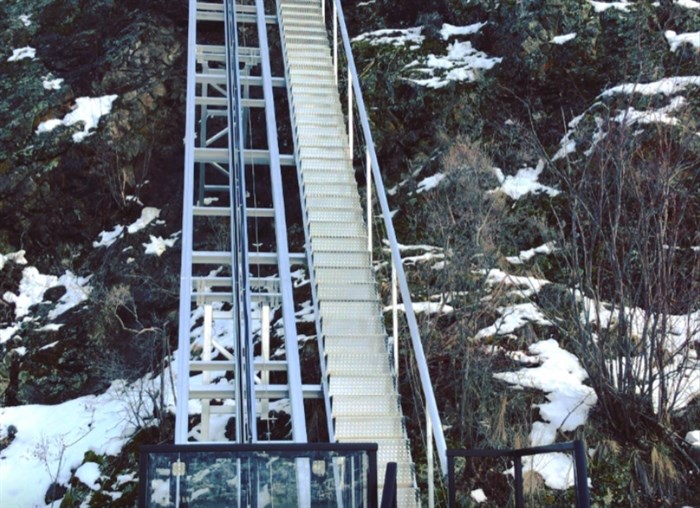
Image Credit: FACEBOOK: Silverspan Trams
September 17, 2022 - 3:30 PM
- This article was originally published May 23, 2022.
A B.C. senior who had to walk up 102 steps to his front door has been awarded $35,000 after the B.C. Human Rights Tribunal ruled his strata had discriminated against him by refusing to build an outdoor elevator to access his property.
The Tribunal also ordered the strata to build the $150,000 outdoor elevator within the next six months.
According to a May 18 B.C. Human Rights Tribunal decision, Gerald Testar lived in a detached house on a strata lot that contained three other properties.
To access the 84-year-old's home meant climbing seven flights of stairs.
As the senior's health declined he struggled more with the stairs and in 2020 he proposed that the strata build an outdoor elevator to access his property.
The outdoor elevator was set to cost roughly $150,000 and take a minute-and-a-half to travel from Testar's front door to the strata parking lot.
However, the strata rejected Testar's proposal and presented its own options which included a chairlift being built.
Testar said a stairlift wouldn't be possible because he'd have to squat to get on and off which wasn't feasible with his health.
The strata still insisted on the chairlift and agreed to each pay $17,500 to install it.
Testar insisted the chairlift wasn't an option because of his health and offered to pay the remaining balance to install the outdoor elevator.
The decision says the strata didn't respond to his suggestion.
READ MORE: Kamloops woman overlooked for promotion wins 1st round at Human Rights Tribunal
During the Human Rights Tribunal hearing, Testar testified that he had been unable to leave his home in three years because he couldn't walk the 102 steps.
"I look out the window and I can't go shopping. I lack access to the meaning of the world out there. My wife Coralee had a stroke in the hospital and I am not able to visit her at all," Testar said.
"I have lost my connection to community including a cardiac rehabilitation program. I miss my friendships from that program I feel isolated and I fight depression on a daily basis. I like to interact with people in the community. I like to shop. I have to rely on family to take out the garbage. I do not have any independence."
The strata argued an outdoor elevator would have to be of commercial grade and accessible for all strata owners. The commercial nature of the elevator would also increase the price.
There was also some ambiguity as to whether an outdoor elevator would need a municipal permit.
During the hearing, the three other strata members aired their concerns about an outdoor elevator being built.
Zillah Tin said she lived at the property between two and five months of the year and she was concerned about the noise, the impact on her view, the cost, and the effect on the landscape.
Another neighbour, David Luba, said he was concerned about the outdoor elevator "impacting the beauty, nature and trees at the strata," as well as the cost because he was stretched financially, and the impact on his basement suite.
Dr. Paul Brantingham, who also lived at the strata, was concerned about the "disturbance to the pristine landscape," the impact of his forest view, the cost and how close it would come to his property line.
The Tribunal dismissed all the neighbours' arguments.
"There is no question that Mr. Testar has experienced adverse impacts as a result of his inability to traverse the 102 stairs to and from his home," the Tribunal ruled. "The stairs adversely impact him in a way that they do not for other residents who do not suffer from his physical disability. The stairs limit his ability to take part in the life of the community on an equal level with others."
The Tribunal found that the strata had failed to prove that installing an outdoor elevator caused it undue hardship and therefore it had discriminated against Testar by not accommodating his physical disability.
"No one should have to spend their golden years fighting with their strata to have their accommodation needs met," the Tribunal ruled.
Ultimately, the Tribunal ordered the strata to pay Testar $35,000 for "dignity, feelings, and self-respect" and ordered the strata to build the outdoor elevator within six months.
READ MORE: Kelowna engineer wins first round of human rights case over maternity leave
To contact a reporter for this story, email Ben Bulmer or call (250) 309-5230 or email the editor. You can also submit photos, videos or news tips to the newsroom and be entered to win a monthly prize draw.
We welcome your comments and opinions on our stories but play nice. We won't censor or delete comments unless they contain off-topic statements or links, unnecessary vulgarity, false facts, spam or obviously fake profiles. If you have any concerns about what you see in comments, email the editor in the link above.
News from © iNFOnews, 2022